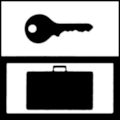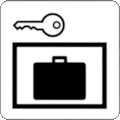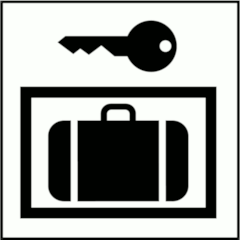Facts and data on pictograms

Synonyms
Baggage Lockers, Coin Lockers
Category
Public Facilities, Public Services, Travel, Transport Facilities, Tourism, Concessions
Message / Function
To indicate the location of lockers for the temporary storage of baggage
| Source | Description | |
|---|---|---|
 |
D'source | Case in outline rectangle, lock fills gap in rectangle |
 |
ISO 7001 | Suitcase in outline rectangle with key inserted in gap |
 |
KFAI | Case in outline rectangle, key fills gap in rectangle |
 |
TC | Suitcase in outline rectangle with door indicated, key above |
 |
SIS | Suitcase in outline rectangle with opening on one side, key with tag above |
 |
Expo 67 | Case in outline rectangle, key above |
 |
ON Testdesign | Suitcase in outline rectangle, key with tag above |
 |
ÖNORM A 3011 | Suitcase in outline rectangle, key above |
 |
ADV | Suitcase in outline rectangle, key below |
 |
NS 1980 | Suitcase in outline rectangle, key below |
 |
BS 8501:2002 | Suitcase with tag in outline rectangle, key below |
 |
Schiphol | Case in outline rectangle, key above |
 |
AIGA | Case in outline rectangle, key above |
 |
Eco-Mo Foundation |
Case in outline rectangle, key above |
 |
Zurich Airport | Case in outline rectangle, outline key above |
 |
Erco | Case in white rectangle on dark background with key above |
 |
EJP | Case inside filled rectangle, key above |
 |
Erben/Sramek | Key in fron/insidet of case inside outline rectangle |
 |
GTAAC | Suitcase or shopping trolley, key in top right corner |
 |
Düsseldorf Airport |
Key above suitcase |
 |
Port | Key above case |
 |
IKEA | Key above shopping basket |
 |
WO'72 | Key in front/inside of case |
 |
O'64 | Key in front/inside of case or bag |
 |
ARS (Ota) | Fat outline rectangle with key inserted |
 |
Picto'grafics | Key inside outline rectangle |
Discussion
The manifold versions shown above are dominated by pictograms based on some kind of hand luggage (suitcase, case) inside of an outline rectangle plus a key outside.
Studies from several countries present research covering most concepts found in pictogram variants for this referent:
Kraft (1976) and Gärling (1985) examined more than twenty pictogram variants using Appropriateness Ranking Tests. Designs showing hand luggage inside an outline rectangle with a key above were rated as most appropriate while variants similar to the pictograms at the bottom of the table above were placed at the end of the line.
With 78 % correct responses the variant labeled ON Testdesign was superior to the design of Erben/Sramek, which reachend 60 % correct in a Comprehension Test (Brugger, 1977). Responses for the latter variant indicate that the key more often was assigned to the case instead of the locker. The concept showing a key inside the suitcase elicited more erroneous responses like 'Lockable Suitcase', 'Suitcase with Key', 'Suitcase Key'. Further Comprehension Test results indicate that adding a tag to the key seems to be irrelevant (Brugger, 1978).
In a Japanese study to propose domestically unified graphical symbols based on scientific methods, the pictogram variant labeled as Eco-Mo Foundation proved to be understood well enough with a comprehension score of 78.5 (Eco-Mo Foundation, 2001). Among college students the pictogram from Amsterdam Schiphol Airport, with colors inverted and therefore very similar to the AIGA version, reached an outstanding comprehension score of 98.5 (Zwaga & Poppinga).
When Fiori (2008) examined a map symbol showing a key above a case similar to the pictogram labeled as Port on basis of a Comprehension Test, only 53.0 % of the responses were classified as correct. Answers reported are for example: Key-rack, Locksmith, Strongbox, Baggage, Trip, Closet and Baggage Rack.
The variant from the Dutch Railways (labeled NS 1980 above) only reached about 46 % correct responses in a Matching Test with a set of 29 symbols (Zwaga & Boersema, 1983). When asked which sign to follow when looking for luggage lockers, a significant number of respondents selected the symbol presented for Left Luggage instead, as the Dutch Railways symbol for Left Luggage of that time was not very clear, since it displayed just a single suitcase inside a closed rectangle with protruding edges.
Recommendations

Based on test results from research known, we recommend the use of a variant like symbol No 37 of ÖNORM A 3011 part 2.
We further suggest to conduct a Comprehension Test comparing concepts like the first three pictograms of the table above with the design of our recommended symbol.
Tests of pictograms of referent Luggage Lockers
Brugger, Ch. (1977): Abschlußbericht über den Erkennungstest. Report to the Austrian Standards Institute, Vienna, 1977-10-04.
Brugger, Ch. (1978): Bericht über die Auswertung des Erkennungstests von November/Dezember 1977. Report to the Austrian Standards Institute (ON) dated 6. 3. 1978, Vienna.
Eco-Mo Foundation (2001): Test data of public information symbols in Japan - Procedure for the testing of public information symbols by the Study Committee. ISO: ISO/TC 145/SC 1 N 329.
Fiori, S. R. (2008): Mapas para o turismo e a interatividade - proposta teórica e prática. Tese de Doutorado - Depto. de Geografia, FFLCH-USP.
Gärling, T. (1985): ISO Appropriateness Ranking Test 1985 - Redovisning av genomförande. Report to the Swedish Standards Institute dated 1985-07-24.
Kraft, E. (1976): Ranking-Test. Report to the Austrian Standards Institute (ON) dated 09/76, Vienna.
Zwaga, H.J. & Boersema, T. (1983): Evaluation of a set of graphic symbols. Applied Ergonomics, 14, 1, 43-54.
Zwaga, H.J.G. & Poppinga, J.: Identification and Legibility of Graphic Symbols; Towards a standard for public information symbols. Internal Report, Psychological Laboratory, University of Utrecht
See also
Safe, Strongbox
Baggage, Left Luggage
Baggage Check-in, Baggage Claim
Baggage Delivery, Baggage Trolley, Porter
Ski Depot, Ski Storage Room, Ski Rack
Updated 2024-12-01 by Ch.Brugger